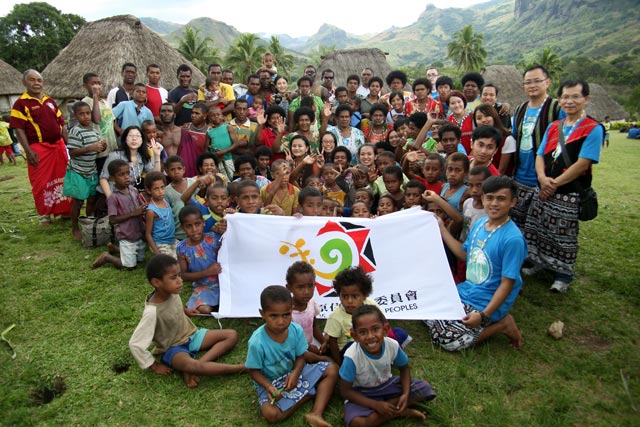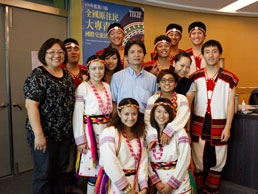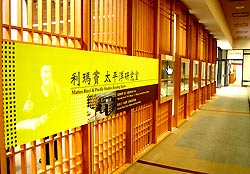Activities
Cultural Exchange Program in Fiji

本屆國際交流地點為斐濟,以其觀光、文化和優美的自然環境聞名,此次國際交流行程也以觀光和文化發展為主軸,參訪四個各俱不同特色原住民村落(Navala Village、Navua Village、Muaivuso Village和Korovo Village) ,另外,也至斐濟南太平洋大學舉行座談會。不但有機會瞭解太平洋區域歷史發展和自治現況,也瞭解太平洋島國人民的自我認同和歸屬感的建構,並也透由和學校的老師和同學的互動,建立未來交流的管道和聯結。最重要的是,此次斐濟原住民事務部 (Ministry of iTaukei Affairs)常務次長 Mr. Savenaca Kaunisela親自接待我們此次的到訪,並且本次國際交流的成果也在斐濟太陽報和斐濟時報兩大報紙刊登,成功讓斐濟國際友人了解台灣原住民文化的特色,更將台灣原住民文化的豐富性推廣國際舞台上!
利氏學社數位典藏網站面世
Currently two phases of our digitalization scheme have already been implemented. The first phase was the Digitalization of the Catholic Evangelism Archives of the Society of Jesus in Taiwan, 1950-2000 Project, which involves digitizing the documents in the Ricci Institute Archives as its primary goal, these were divided into five main categories: research into Taiwan, language research, the history of Catholic evangelism, religious and philosophy and spiritualism and Chinese culture. These documents have considerable research value in terms of the history of evangelism in Taiwan, Sino-French cultural exchange, the comparison of Eastern and Western philosophies, linguistics and Taiwan research.
The second phase of the project began in 2011, in which the Ricci Institute and Fu Jen Catholic University's Research Centre for the Aboriginal Theology of Taiwan, are working in cooperation to digitize aboriginal language liturgy, this project is expected to be completed by the end of 2012. Taiwan aboriginal tribe language Mass to be digitized by this is expected to be 2012 completed by the end. The two plans above have received partial funding from the National Science Council.
In accordance with the National Science Council's recommendations for the process of digitization, each document should have a clear description, and the e-book on the site should mimic the style of a physical book page to provide a user-friendly digital reading environment. Our Digital Archives website is as follows: http://www.riccibase.com/archive/ (the search function has still not been added to the database, but it can be browsed).
第二期計畫始自2011年,利氏學社與輔仁大學原住民神學研究中心(Research Center for Taiwan Aboriginal Theology)合作,將台灣原住民部落的族語彌撒經本予以數位化,預計將於2012年底完成。上述二計畫皆獲得行政院國家科學委員會(National Science Council)提供部份經費補助。
依照國科會建議的數位化作業流程,我們替每一份文件建立清晰的數位資料說明,而且網站上的電子書都能模擬實體書翻頁,提供使用者友善的數位閱讀環境。我們的數位典藏網址為:http://www.riccibase.com/archive/(目前資料庫搜尋功能尚在建置中,但可以使用分類瀏覽)。
Ground-breaking journey to Canada by Taiwan Indigenous Students
 The Executive Yuan’s Council of Indigenous Peoples (CIP) of the Republic of China (Taiwan) has set up a ground-breaking exchange programme which coincides with the 100th anniversary of the Republic of China. The Canada Cultural Exchange Program hosted by the CIP and organized by the Taipei Ricci Institute will bring to Vancouver 15 university students from five separate indigenous tribes spread all over Taiwan. While staying in Canada they will learn about policies and practices which foster indigenous rights, social justice and autonomy.
The Executive Yuan’s Council of Indigenous Peoples (CIP) of the Republic of China (Taiwan) has set up a ground-breaking exchange programme which coincides with the 100th anniversary of the Republic of China. The Canada Cultural Exchange Program hosted by the CIP and organized by the Taipei Ricci Institute will bring to Vancouver 15 university students from five separate indigenous tribes spread all over Taiwan. While staying in Canada they will learn about policies and practices which foster indigenous rights, social justice and autonomy.
The indigenous population in Taiwan is just over half a million accounting for about 2.1% of the population. There are currently 14 recognized aboriginal tribes in Taiwan all with their own distinct culture and language: the Amis, Atayal, Saisiyat, Bunun, Kavalan, Tsou, Rukai, Puyuma, Truku, Paiwan, Tao, Thao, Sakizaya and the Seediq, the latter being the last tribe to be recognized, in 2008. The Council for Indigenous Peoples was founded on December 10, 1996 with the mission of advancing aboriginal issues.
The Ricci Institute draws on its wealth of experience in organising and fostering cross-cultural activities and dialogue to organise a 10-day trip to the Vancouver region from the 4th to the 13th September 2011. They have prepared exchanges with local universities, community organisations, government agencies, indigenous cultural and touristic parks in the Vancouver region so that the students may gain first-hand knowledge and experience of socio-political and economic policies regarding indigenous peoples.
As a precursor to the trip to Vancouver, in July the students also all spent five days in Southeast Taiwan, where they were given preparatory classes in comparative history, English language, and even singing and dancing to put them in good stead for their coming journey.
You can find out more about this journey in the Focus put together by eRenlai Magazine in December 2011
天主教耶穌會在台灣1950-2000傳教文獻數位典藏計畫
Project of Catholic Evangelization Archives Digitalization of Society of Jesus in Taiwan, 1950-2000
Therefore, this project is under the effort of creating an archive of "The History of the Catholic evangelization in Taiwan."We wish to digitize a total collection of many historical documents stored in Taipei Ricci Institute, which are the collections of the works done by the Society of Jesus and the Jesuits in Taiwan from 1950 to 2000. These documents also including Taiwan study, linguistics, history of evangelization, and other academic research documents. The digitalization of these historical documents will create many advantages for the researches and also for many international studies on Taiwan.
而在1952 年至今將近六十年的時間裡,可說是台灣天主教傳教史上相當特殊的一段時期。約自1952 年開始,外籍傳教士因戰亂之故紛紛離開中國,因此在後來的幾年裡,許多原本散居於中國大江南北的各國籍耶穌會士陸續聚集至台灣,建立新的教區,並開展新的傳教工作。
利瑪竇太平洋研究室 / Matteo Ricci & Pacific studies Reading Room
 由一本古書的牽線,成就了國家圖書館與耶穌會台北利氏學社攜手合作的姻緣。99年1月30日,雙方簽署了學術合作協議,合作計畫的精神與宗旨,在於利氏學社的藏書,其他合作議題尚包括協助籌設臺灣太平洋研究學會、珍貴史料數位化工程、合作出版學術書刊,並持續加強本專室書刊之徵集等。
由一本古書的牽線,成就了國家圖書館與耶穌會台北利氏學社攜手合作的姻緣。99年1月30日,雙方簽署了學術合作協議,合作計畫的精神與宗旨,在於利氏學社的藏書,其他合作議題尚包括協助籌設臺灣太平洋研究學會、珍貴史料數位化工程、合作出版學術書刊,並持續加強本專室書刊之徵集等。
利氏學社以利瑪竇為名,近五十年來致力於國際漢學、比較宗教、語言學等多元文化領域的研究,編纂出版《利氏漢法辭典》(Le Grand RICCI)並創辦《人籟論辨月刊》,以往因編纂字典收藏不少書籍,以語言學、哲學、社會科學為大宗,為促進學術研究的風氣,使更多人能充分利用該批藏書,遂將其永久寄存(Permanent Loan)國家圖書館,而國家圖書館擁有最理想的典藏環境,對珍貴文獻及歷史檔案的保存與數位化,更具豐富經驗與專業水準,對利氏學社寄存的圖書,為兼顧典藏與閱覽服務的需求,於六樓設立「利瑪竇太平洋研究」專室。
Ancient books form the link in a collaborative partnership that has been forged between the National Central Library in Taipei and the Taipei Ricci Institute. On January 30, 2010, the two institutions signed an academic collaboration agreement, the spirit and purpose of which lie in housing and making publicly available the Ricci Institute’s book collection. Other areas for cooperation under discussion include assisting in the establishment of a Taiwan Pacific Research Institute, digitizing valuable historical materials, jointly publishing academic books and journals, and continually strengthening the reading room’s collection.
Named after the famous Jesuit missionary Matteo Ricci, over the last 50 years the Ricci Institute has been devoted to research in fields such as international Chinese Studies, comparative religion, and linguistics. The Institute is the compiler and publisher of Le Grand Ricci (a Chinese-French dictionary), and also founder and publisher of Renlai Magazine. During the process of compiling its dictionary it amassed a considerable number of books, particularly relating to linguistics, philosophy and the social sciences. In order to promote an atmosphere supporting academic research, and allow many more people able to make full use of its collection, the Institute has permanently loaned them to the National Central Library. The Library possesses the ideal environment to house such a collection, with extensive experience in preserving and digitizing valuable historical documents and records to a professional standard. To fulfill the need to safely store and make available for reading the books entrusted to it by the Ricci Institute, the Library has established the Matteo Ricci & Pacific Studies Reading Room on the 6th floor.
